Get to know Elkanah, the biblical figure whose faith and family dynamics paved the way for one of Israel's greatest prophets.
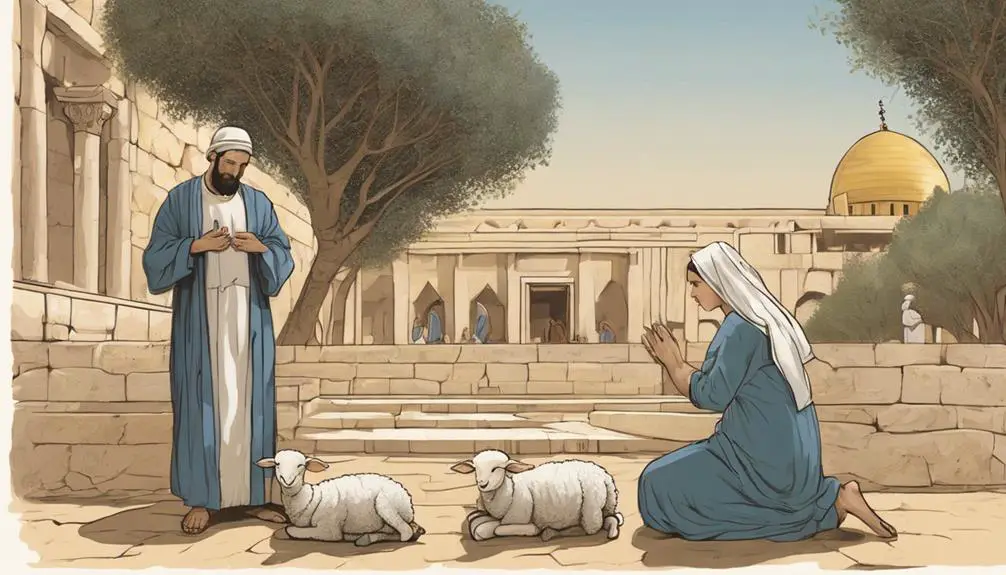
Who Was Elkanah in the Bible
In the grand tapestry of biblical narratives, you might find Elkanah's story less spotlighted than a viral tweet, yet its layers are rich with familial drama and faith.
You're looking at a man who lived in the hill country of Ephraim, notable for his polygamous family and the profound impact of his son, Samuel, on Israel's history.
Navigating through his life's complexities, you'll uncover the significance of Samuel's birth and Elkanah's unwavering devotion, which set the stage for monumental shifts in Israel's spiritual and political landscape.
The intriguing dynamics within his family and his role in Samuel's dedication invite a closer look into how his legacy is more than just a footnote in biblical history.
Key Takeaways
- Elkanah was a devoted Levite from Ephraim, deeply engaged in worship and sacrificial rituals at Shiloh.
- His family life, marked by polygamy, showcased the complexities of emotional and societal challenges within his household.
- The birth of his son Samuel, under divine circumstances, played a crucial role in Israel's transition from judges to monarchy.
- Through his faith and dedication, Elkanah's legacy contributed significantly to the prophetic tradition and religious reform in Israel's history.
The Life of Elkanah
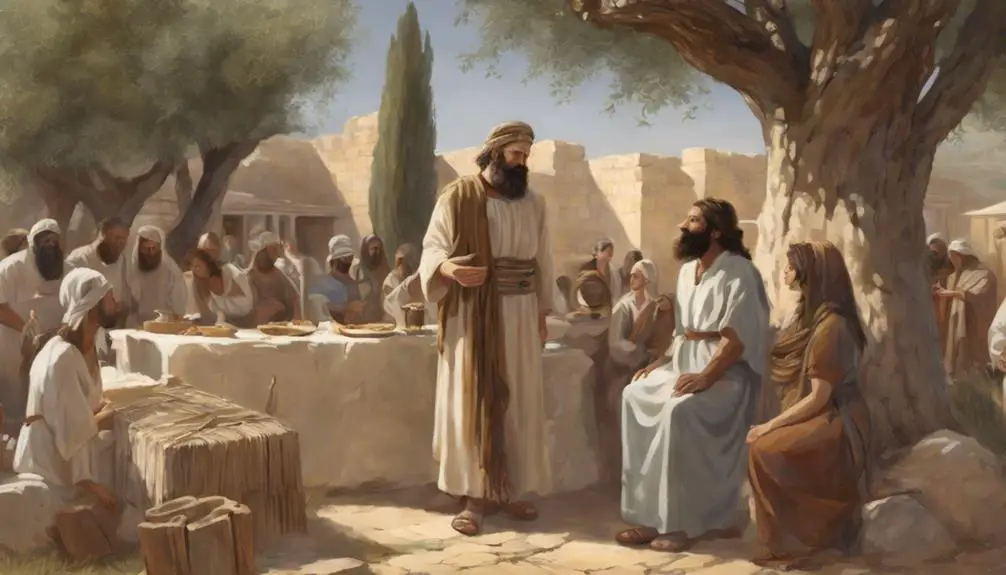
Elkanah, a Levite from Ephraim's hill country, played a pivotal role in the narrative of the early Samuel period, demonstrating the complexity of familial and religious obligations in ancient Israel. His life, intricately tied to his occupation and worship practices, offers a window into the socio-religious fabric of his time. As a Levite, Elkanah's occupation was deeply embedded within the religious community, serving not just as a profession but as a divine calling, underscoring his commitment to the spiritual welfare of his community.
Elkanah's worship practices were central to his life, reflecting the broader religious landscape of ancient Israel. His annual pilgrimages to Shiloh, a major cultic center, to offer sacrifices underscore the importance of religious festivals and communal worship. These journeys weren't merely religious obligations but were imbued with deep personal and communal significance. They reinforced social bonds and provided a framework for expressing devotion and seeking divine favor.
Moreover, Elkanah's adherence to sacrificial rituals, as prescribed in Levitical codes, highlights the intricate relationship between worship practices and societal norms. His actions demonstrate a conscientious engagement with the prescribed religious duties, emphasizing the role of sacrifice in maintaining a covenant relationship with Yahweh.
In analyzing Elkanah's life, one observes the confluence of personal faith, occupational identity, and communal worship practices. His devotion to fulfilling religious obligations amidst the challenges of his personal life offers insights into the lived experience of faith in ancient Israel, where personal piety and communal religious observance were inextricably linked.
Family Dynamics and Challenges
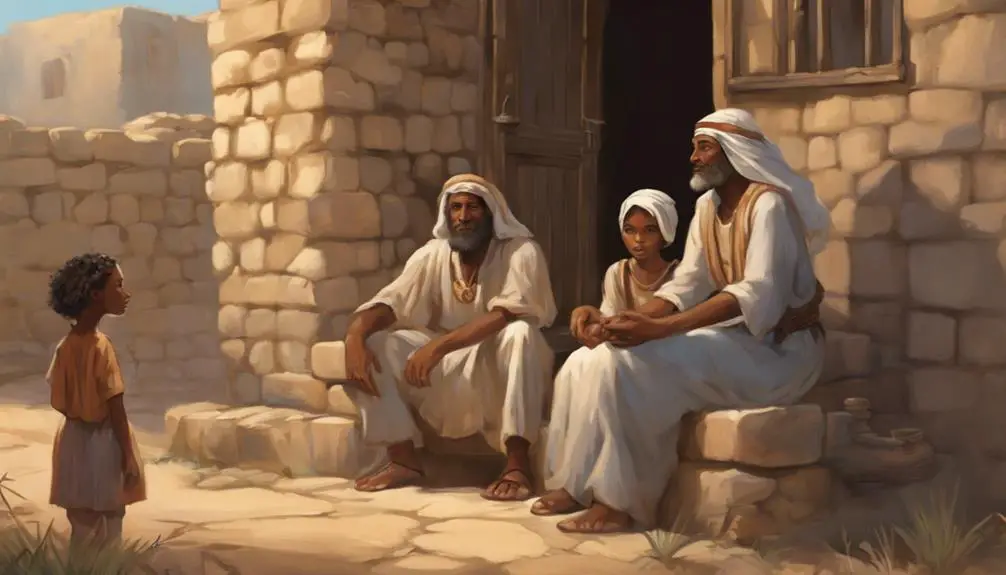
Delving into the family life of Elkanah reveals a complex web of relationships and challenges that underscore the intricate interplay between personal faith and familial duties in ancient Israelite society. His household, marked by the practice of polygamy, serves as a poignant example of the broader cultural norms and their impact on individual family members. This practice, while accepted, brought its own set of complications, deeply influencing the dynamics within Elkanah's family.
Here are four key aspects of these family dynamics and challenges:
- Polygamy Effects: Elkanah's marriages to Hannah and Peninnah, while culturally accepted, led to a competitive and conflict-ridden environment. This competition wasn't just for Elkanah's affection but also for social status within their community, highlighting the personal and societal pressures polygamous families faced.
- Emotional Strife: The rivalry between Hannah and Peninnah, exacerbated by Hannah's initial barrenness, created an atmosphere of emotional distress. This not only affected their personal well-being but also impacted their relationships with Elkanah and their children, illustrating the deep emotional undercurrents within polygamous households.
- Cultural Norms: The societal expectation for women to bear children, especially sons, placed immense pressure on Hannah. This cultural norm amplified the emotional and psychological stress within the family, demonstrating how societal expectations can exacerbate personal challenges.
- Familial Duties vs. Personal Faith: Elkanah's role as the head of a devout Israelite family required him to navigate the delicate balance between adhering to cultural norms and attending to the unique needs of his wives and children. This highlights the tension between personal faith and familial obligations in the context of their society.
Analyzing these aspects sheds light on the complexities and nuanced challenges faced by Elkanah's family, providing a detailed look into the effects of cultural norms and polygamy in ancient Israelite society.
The Significance of Samuel's Birth

Amid the complexities of Elkanah's family dynamics, the birth of Samuel emerges as a pivotal moment, symbolizing the resolution of emotional strife and illuminating the profound impact of faith on personal and familial destinies. The narrative of Samuel's birth is intricately linked to a miraculous conception, underscoring the theme of divine intervention in human affairs. This event isn't merely about the end of Hannah's barrenness but also signifies a turning point in Israel's history, heralding the arrival of a significant prophet who'd lead with spiritual insight and moral integrity.
The circumstances surrounding Samuel's birth reflect a broader theological motif prevalent throughout the scriptures, where moments of deep despair are often met with divine intervention. You'll notice that Hannah's fervent prayers and her vow to dedicate Samuel to God's service underscore her unwavering faith. This act of devotion is rewarded, demonstrating that sincere faith can lead to miraculous outcomes.
Moreover, Samuel's birth represents the fulfillment of divine promises and sets the stage for the transition from the period of the judges to the establishment of monarchy in Israel. It's a testament to the idea that individuals, no matter how humble their beginnings, can play critical roles in the unfolding of God's plan for His people.
In analyzing the significance of Samuel's birth, it's clear that this event isn't just about the joy of a long-awaited child; it's a profound narrative about hope, faith, and the power of divine intervention to alter the course of history.
Elkanah's Role in Samuel's Dedication

In the narrative of Samuel's dedication, Elkanah emerges as a pivotal figure, demonstrating the essential role of paternal support in fulfilling vows made to God. His involvement highlights the intertwining of family dynamics with Temple practices, underscoring a deeper understanding of the spiritual and social fabric of ancient Israelite society. Elkanah's role is multifaceted, reflecting not only adherence to religious obligations but also showcasing the importance of supporting and validating the spiritual commitments made by family members, specifically in relation to Hannah's vow.
Here are four key aspects of Elkanah's role in Samuel's dedication:
- Understanding and Support: Elkanah's unwavering support for Hannah's vow to dedicate Samuel to the Lord exemplifies his deep understanding of the commitments made to God. This support is crucial for the fulfillment of the vow, setting a precedent for the importance of family in religious devotion.
- Active Participation: Elkanah actively participates in the dedication process, which involves traveling to Shiloh, offering sacrifices, and formally presenting Samuel to Eli the priest. This highlights his role in the practical aspects of fulfilling the vow, integrating Temple practices into the narrative.
- Spiritual Leadership: By leading his family in worship and fulfilling the vow, Elkanah exemplifies spiritual leadership. His actions demonstrate the significance of headship in guiding family members through religious practices and commitments.
- Legacy and Influence: Elkanah's dedication of Samuel not only fulfills a personal vow but also contributes to the larger narrative of Israel's history. His actions set a foundation for Samuel's prophetic ministry, reflecting the profound impact of parental dedication on a child's spiritual destiny.
Faith and Devotion in Elkanah's Story
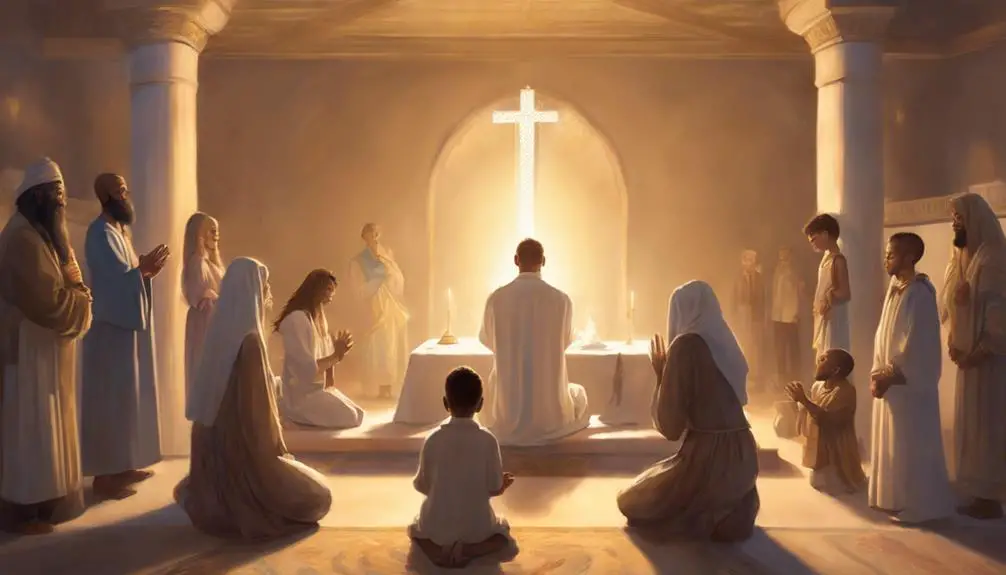
Building on Elkanah's demonstrated commitment through Samuel's dedication, his story further unfolds a profound narrative of faith and devotion that underscores his spiritual journey. His actions, deeply rooted in prayer practices, showcase a level of spiritual leadership that's both commendable and instructive. Elkanah's consistent visits to Shiloh for worship, despite the challenges of his time, highlight his unwavering faith and dedication to God's commandments.
Elkanah's approach to prayer wasn't superficial but marked by a depth of sincerity and understanding of its power. He didn't merely engage in prayer practices as ritualistic obligations but as genuine expressions of his faith and trust in God. This is particularly evident in how he supported Hannah's vow to dedicate Samuel to the Lord, understanding the significance of such a commitment.
Moreover, Elkanah's spiritual leadership within his family sets a remarkable example. His actions and decisions reflect a man deeply committed to guiding his family in the ways of faith, even when faced with personal sacrifices. By prioritizing spiritual obligations over worldly concerns, Elkanah teaches us the importance of putting God first, demonstrating that true leadership is about serving others and God.
In analyzing Elkanah's story, it's clear that his faith and devotion weren't passive traits but active forces that shaped his life and those around him. His example serves as a powerful testament to the impact of living a life grounded in faith, prayer, and spiritual leadership, offering valuable lessons for anyone seeking to deepen their spiritual journey.
Legacy and Impact on Israel's History
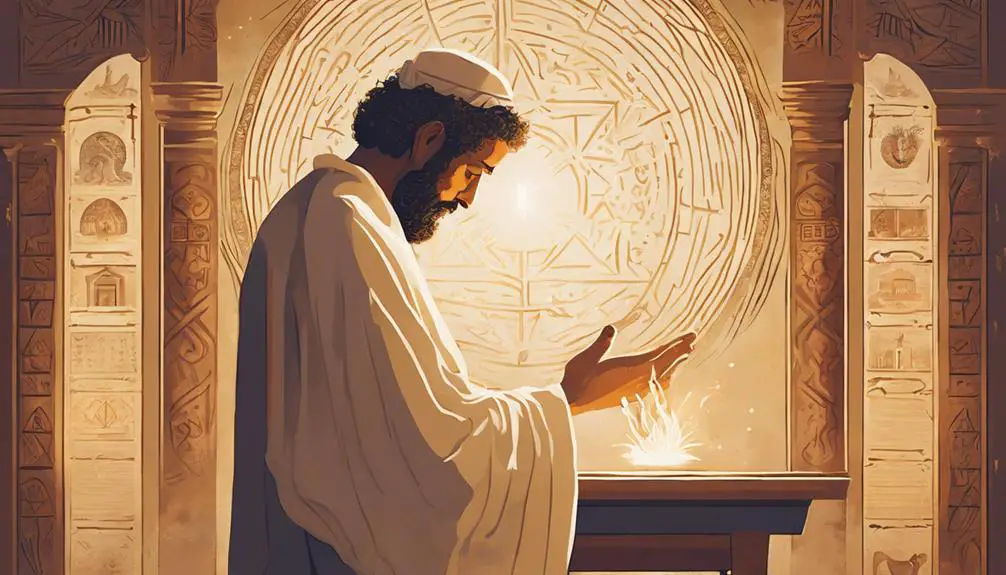
Elkanah's legacy, through his son Samuel's pivotal role, significantly shaped Israel's history and spiritual direction. You'll find his influence deeply embedded in the cultural practices and political context of ancient Israel. Analyzing his impact, you discern a multifaceted legacy:
- Introduction of Monarchy: Samuel, under divine guidance, anointed the first two kings of Israel, Saul and David. This transition from tribal confederacy to monarchy fundamentally altered the political landscape of Israel, setting a precedent for centralized governance.
- Religious Reform: Samuel's leadership catalyzed significant religious reforms. He reinvigorated the importance of the covenant with Yahweh, steering the Israelites away from Canaanite religious practices. This move not only preserved their unique cultural identity but also reinforced monotheism as a cornerstone of their faith.
- Prophetic Tradition: Samuel's role as a prophet laid the groundwork for the development of the prophetic tradition in Israel. His life exemplified the prophet's role as both a spiritual leader and a social critic, challenging the people and their leaders to adhere to God's commandments within the complex political context of their time.
- Judicial Leadership: Beyond his religious and political roles, Samuel also served as a judge, providing legal and moral guidance. His judgments and teachings helped shape the moral and ethical framework within which Israel operated, influencing subsequent generations.
Elkanah's contribution to Israel's history, therefore, transcends his personal story, embedding itself in the nation's collective memory through Samuel's enduring legacy. This interplay between cultural practices and political context under Samuel's guidance highlights the profound impact of Elkanah's lineage on Israel's evolution.
Frequently Asked Questions
How Does Elkanah's Story Reflect the Social and Cultural Norms of His Time Regarding Polygamy and Its Implications for Family Life?
Elkanah's story highlights how polygamy was intertwined with marriage dynamics and fertility practices of his era. It shows you the societal pressure to produce heirs and how multiple wives became a solution for fertility issues.
This narrative sheds light on the emotional and social complexities within such families, reflecting broader cultural norms that valued offspring above marital harmony.
It's a vivid example of how family life was deeply influenced by societal expectations around procreation.
In What Ways Does Elkanah's Relationship With God Differ From the Spiritual Practices of His Contemporaries in the Biblical Narrative?
You'd find it fascinating that in ancient times, only a small percentage of people directly sought Divine Favor through personal sacrifices.
Unlike his contemporaries, Elkanah's relationship with God uniquely emphasized sacrificial offerings, highlighting a deeper, more personal commitment. His practices diverged from the norm, wherein most relied on intermediaries for spiritual communication.
This approach not only set him apart but also underscored the importance of individual devotion in seeking Divine Favor.
How Does the Story of Elkanah Contribute to Our Understanding of the Role of Prayer and Divine Intervention in the Lives of Biblical Figures?
Elkanah's story illuminates the significance of prayer and divine timing in the lives of biblical figures. It shows you how sincere prayer isn't just a plea but a dialogue with the divine, emphasizing its pivotal role.
His narrative exemplifies that divine intervention follows not only faith but also the right timing, teaching you that patience and persistence in prayer are crucial.
This analysis offers a deeper understanding of spiritual practices and divine relationships in biblical contexts.
Are There Any Archaeological Findings or Historical Documents Outside the Bible That Corroborate the Existence or Life Events of Elkanah?
You might think it's hard to verify ancient figures, but when it comes to archaeological debates and the quest for document authenticity, the story changes.
Currently, there aren't direct archaeological findings or historical documents outside the Bible that specifically corroborate Elkanah's existence or life events. This lack doesn't negate his historical significance but highlights the challenges in bridging biblical narratives with archaeological evidence, inviting a deeper, analytical exploration into ancient texts and material culture.
How Has the Story of Elkanah Been Interpreted or Utilized in Different Religious Traditions and Denominations Throughout History?
You'll find that Elkanah's story has been interpreted in diverse ways across religious traditions and denominations. In interfaith dialogues, it's often cited to showcase the complexity and depth of biblical characters.
Modern interpretations focus on the nuances of his faith and family life, offering a rich field for theological and ethical discussion. Scholars analyze these variations to understand how different beliefs shape the perception of biblical narratives, enriching our knowledge of faith and history.
Conclusion
In sum, Elkanah, a seemingly minor character etched into the vast biblical narrative, paradoxically stands as a colossal figure in Israel's spiritual lineage. His ordinary family life, marred with challenges and rivalries, set the stage for an extraordinary outcome: the birth of Samuel, a prophet pivotal to Israel's destiny.
Through Elkanah's story, we're reminded of the irony that sometimes, it's the most unassuming figures who leave the most indelible marks on history, challenging us to rethink our perceptions of significance and legacy.


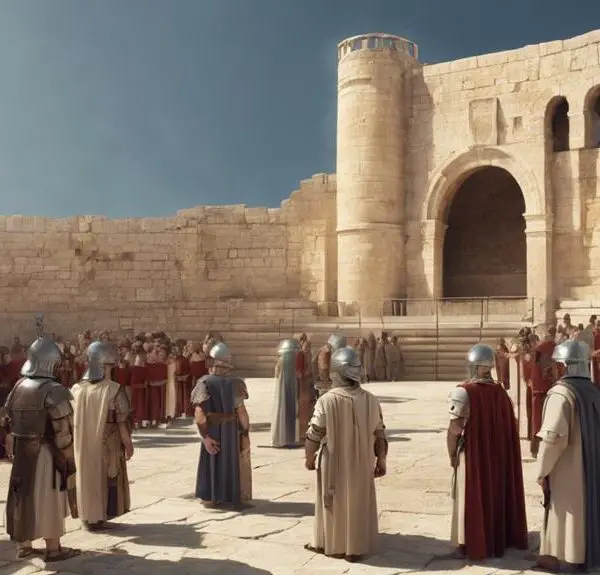
Sign up